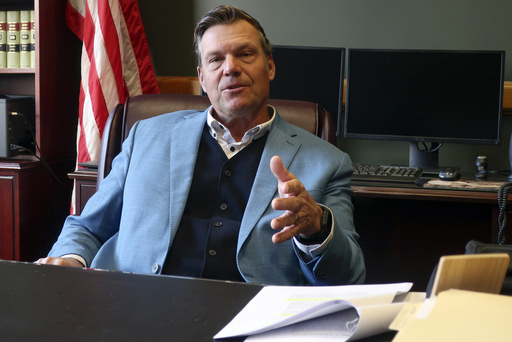Topeka, Kansas – An official in Kansas, who has been an informal adviser to President-elect Donald Trump’s transition team regarding immigration, expressed that he does not foresee mass deportations leading to the apprehension of migrants in sensitive areas, such as educational institutions and places of worship.
Kansas Attorney General Kris Kobach anticipates, however, that there will be actions taken by Trump that will likely ignite a legal debate surrounding the citizenship rights of children born in the U.S. to undocumented immigrants. He also believes that Trump will advocate for the involvement of state and local law enforcement in the efforts to arrest and detain undocumented migrants.
Kobach has been a prominent figure in the Republican movement that seeks to limit illegal immigration for the past twenty years. A steadfast supporter of Trump, he could play a vital role considering the necessity for state and local cooperation to fulfill Trump’s objective of conducting the largest deportation operation in U.S. history. During a recent interview, Kobach mentioned that he regularly communicates with Trump’s team, including Tom Homan, designated as the border czar, and Stephen Miller, the incoming deputy chief of staff for policy.
When asked about the feasibility of deporting millions of immigrants, Kobach acknowledged that critics claim such a massive operation is impractical. Nonetheless, he and other Trump supporters believe that if a significant number of migrants are deported, many others may choose to leave voluntarily. “Once there’s a massive enforcement effort going on, then a lot of people start leaving on their own,” Kobach stated, suggesting a multiplier effect where more individuals would opt to exit to avoid arrest.
Kobach also addressed concerns raised by advocates for immigrant rights about potential arrests in sensitive locations. He stated, “I haven’t heard this,” referring to the possibility of a policy reversal regarding these locations, and noted that the focus will likely be on adult individuals rather than K-12 students. According to him, law enforcement may need to decide carefully where to make arrests to minimize any public risk.
On the topic of birthright citizenship, which grants citizenship to anyone born in the U.S. irrespective of their parents’ legal status, Kobach acknowledged that any action taken by the Trump administration regarding this issue would inevitably face legal scrutiny. He mentioned, “I believe that the Trump administration has every intention of addressing this issue, in his second term.”
Regarding the essential cooperation of state and local officials in deportation efforts, Kobach highlighted a federal immigration law provision that enables local law enforcement agencies to partner with U.S. Immigration and Customs Enforcement (ICE). This partnership allows local officers to be trained and authorized to arrest undocumented migrants, acting as a force multiplier for the federal government.
When questioned about potential detainment facilities for immigrants, Kobach noted that the Biden administration has reduced the capacity for detaining undocumented individuals in ICE facilities. However, ICE has recently sought information on possible new detention centers in various states, including California and Arizona. He added that Trump might pursue new contracts with counties to house detained immigrants, mentioning his previous work with Texas counties that possess larger jails than are needed for local offenders. Kobach concluded by indicating that the Trump administration is aware of the challenges surrounding immigrant detention and is actively looking into solutions.



